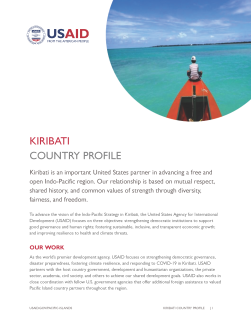Kiribati

Country Profile
Kiribati is an important United States partner in advancing a free and open Indo-Pacific region. Our relationship is based on mutual respect, shared history, and common values of strength through diversity, fairness, and freedom.
To advance the vision of the Indo-Pacific Strategy in Kiribati, the United States Agency for International Development (USAID) focuses on three objectives: strengthening democratic institutions to support good governance and human rights; fostering sustainable, inclusive, and transparent economic growth; and improving resilience to health and climate threats.
OUR WORK
As the world’s premier development agency, USAID focuses on strengthening democratic governance, disaster preparedness, fostering climate resilience, and responding to COVID-19 in Kiribati. USAID partners with the host country government, development and humanitarian organizations, the private sector, academia, civil society, and others to achieve our shared development goals. USAID also works in close coordination with fellow U.S. government agencies that offer additional foreign assistance to valued Pacific Island country partners throughout the region.
DEMOCRACY AND GOVERNANCE
In Kiribati, USAID provides human rights training to track and follow up on the country’s commitments under the Universal Periodic Review process. In addition, USAID programs promote open data and greater transparency, strengthen the judiciary, enhance the capabilities of financial governance institutions, support local civil society organizations, enhance civic education, and bolster the capacities of the media.
ECONOMIC GROWTH
USAID provides technical assistance to Kiribati and FSM for the East Micronesia Cable, a project that will advance economic resilience, drive development opportunities, and improve living standards through improved telecommunications connectivity, bringing the Micronesian region closer together, as well as closer to the rest of the world. This project, supported by Australia, Japan, and the United States, will build an undersea cable to connect the state of Kosrae in FSM, Tarawa in Kiribati, and Nauru to the existing HANTRU-1 cable, located in Pohnpei, FSM. The East Micronesia Cable will provide faster, higher quality and more reliable and secure communications, connecting more than 100,000 people in the Micronesian region.
ENVIRONMENT AND CLIMATE CHANGE
Transparent and effective environmental resource management is a priority for USAID in Kiribati and an important factor in the country’s economic future. USAID programs strengthen coastal fisheries monitoring and surveillance and promote compliance with fishing regulations in Kiribati and the Pacific region. To promote adaptation and resilience, USAID will mobilize sustainable climate finance; increase access to climate resilient, high-quality investment and infrastructure; improve the enabling environment; and advance climate-smart livelihoods.
DISASTER PREPAREDNESS AND RESPONSE
Climate and disaster risks are existential threats to Pacific Island countries like Kiribati. USAID is strengthening the resources and systems that Kiribati needs to prepare for and address the effects of climate change and disasters, making communities more resilient. This includes efforts to mobilize youth and volunteers in disaster preparedness through the Kiribati Red Cross Society (KRCS) and capacity building for the KRCS through the International Federation of the Red Cross and Red Crescent Societies. In 2022, USAID provided humanitarian assistance funding to respond to the drought across Kiribati due to below normal rainfall exacerbated by the ongoing impacts of climate change. With this funding, United Nations Children’s Fund (UNICEF) is strengthening the capacity of the government to monitor groundwater, including the salinity levels, and provide critical water conservation and treatment messaging to affected populations.
CROSS CUTTING
USAID is strengthening the capacity of locally established civil society organizations in the Pacific to address the second order impacts of the COVID-19 pandemic. USAID assistance supports communities to increase their resilience to disasters and climate risks, enhance their livelihoods, increase food security, improve access to water, bolster health and education, improve governance, manage natural resources more sustainably, and conserve vital biodiversity.


